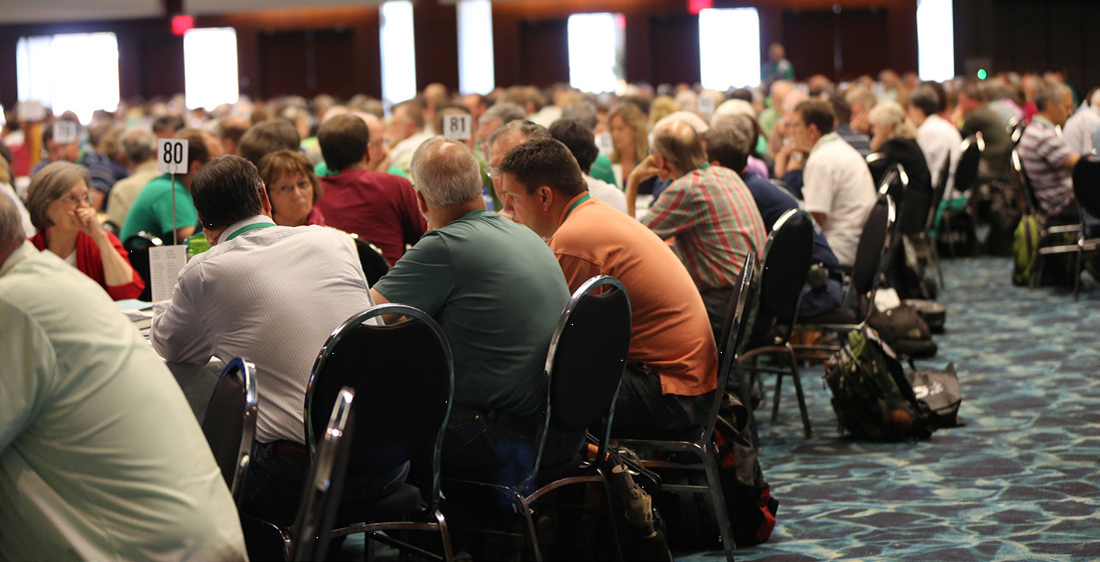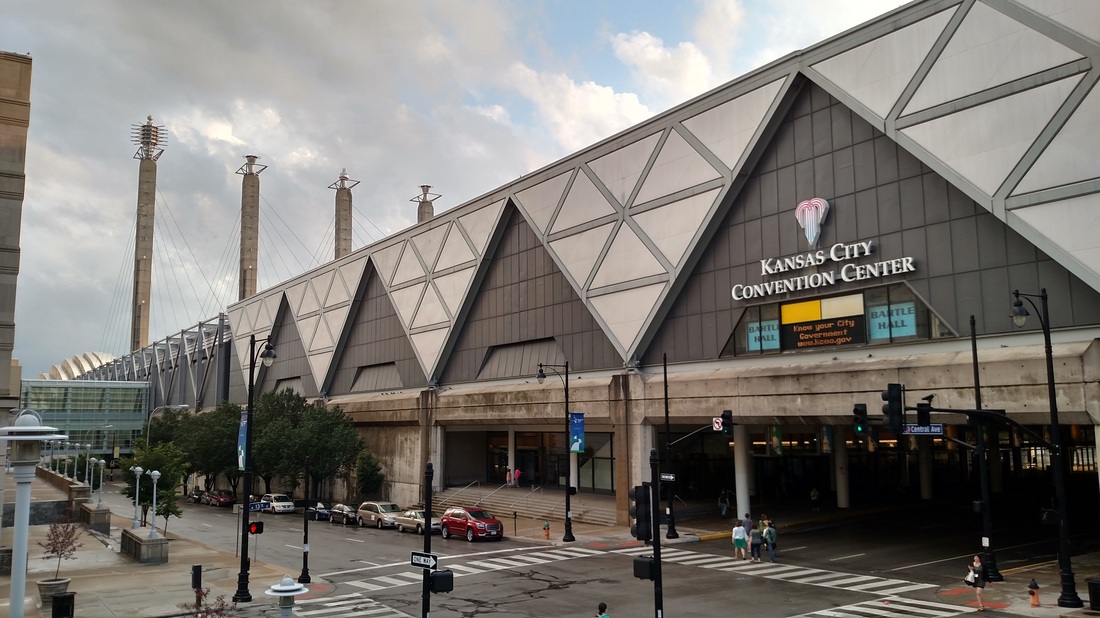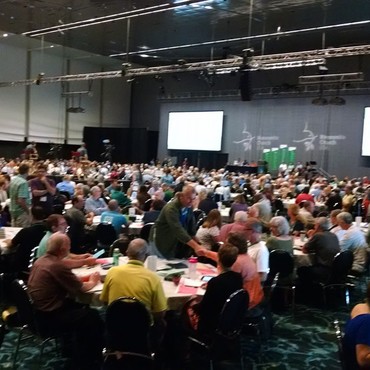(or . . . “How we talked, wept, shouted, laughed, and voted our way through
a passel of resolutions at Kansas City, and I came out the other end in one piece,
still loving Jesus, still loving my Mennonite family”)
a passel of resolutions at Kansas City, and I came out the other end in one piece,
still loving Jesus, still loving my Mennonite family”)
by Phil Kniss
It was not a quiet week in Kansas City—“city of fountains, heart of the nation.” All over the city public fountains shot geysers of water into the air, propelled by well-orchestrated high-pressure systems hidden from view. Inside the convention center, other things bubbled up—now here, now there—often when least expected. These spontaneous fountains of joy, pain, fear, uncertainty, hope, were propelled by pressure systems not fully understood or predicted, and rarely orchestrated to everyone’s satisfaction.
Part of my job was to lead Table 80, nine delegates seated in a circle to build relationships and do good discernment on weighty matters facing the church. There were 90-plus tables just like ours, with the same task at hand. Our table had delegates from across the entire geographical and theological spectrum of the church, from Mountain States to North Central Conferences. We learned to know each other. We listened to each other’s hopes and fears. We were present with each other in our tears and anxiety and joyful hope. Two of our nine, at week’s end, respectfully but clearly informed our table that it was finished between MCUSA and their congregation. They thanked us for the good conversations that week, wished us well, and took their leave before the meetings ended. We were saddened, of course, but grateful we could be with them as a small community of caring and sharing during a tense week of denominational work.
A lot of wonderful things happened last week in the worship services, in the hallways, in seminar rooms, and yes, even in the delegate assembly hall. Joyful hymns were sung, stirring sermons were delivered, challenging workshops were presented, and rich conversations happened everywhere. In the delegate sessions, we overwhelmingly passed several important resolutions. One was a statement expressing our sorrow at the sin of sexual abuse in our midst, and pledging to institute preventative measures, support survivors, and work for the healing of all. Another resolution stated our unequivocal support of our African-American brothers and sisters traumatized by the Charleston shootings, and pledged to provide tangible aid to the churches burned down since then. Another statement lamented our country’s involvement in “endless war,” and particularly decried the use of remotely-controlled robotic drone warfare. A fourth was a brief resolution in support of our peacebuilding partners in Israel-Palestine, and pledging to study the situation there diligently over the next two years. This resolution emerged after a longer resolution was tabled until our next assembly in two years, after various points of concern were raised. The substitute resolution passed unanimously.
But the most time, energy, and collective angst was spent on two resolutions relating to same-sex issues—the “Forebearance” resolution (passed with 71%), and the “Membership Guidelines” resolution (passed with 60%). I suspect Table 80 was representative of most of the tables in that hall, in that we had a wide range of opinions and experiences and convictions that we brought to the conversation. We spoke clearly but respectfully with each other. There were some tears of sorrow or empathy in our circle, but never a raised voice or unkind words. We joined in prayer several times, and felt truly cared for by each one around the table.
It was a different experience when it came to open microphone time, as various individuals sought to be heard by this body of 800+ delegates, and by our denominational leaders. Time was relatively short for delegate response. As moderators tried to keep things moving along, not everyone had an opportunity to have their concerns heard or questions answered. At several points in the proceedings, delegates and onlookers voiced (sometimes shouted) considerable personal pain, anguish, and anger.
The “Pink Menno” group and like-minded allies were noticeably present, as delegates in the assembly and as guests gathered on the perimeter. They organized hymn sings, workshops, and several public actions to give voice and visibility to their concerns. Many in that group, and other advocates for full LGBTQ inclusion, were deeply pained by the passage of the “Membership Guidelines” resolution. Many delegates who did not share their viewpoints, were nevertheless deeply moved by their expressions of genuine pain and disappointment. Many delegates were also moved by the honest and gracious laments of the more conservative voices, including many of our Hispanic sisters and brothers who were pained by rapid changes happening in the church in recent years.
Two ways of “being church” emerged in that delegate assembly, which stood in stark contrast to each other. One emerged at the tables, where the context was personal, interactive, and organic. The other emerged on the assembly floor, where the context was more institutional, adversarial, and structural.
At the tables, our aim was to listen carefully and attend to the brothers and sisters with whom we shared space around a table. In that context, we were good at “being church” and “doing church” despite of (or even because of) our differences. We all began with the assumption that we belonged at that table, that we all had a legitimate voice, that we all had spiritual and moral integrity, and that we all sought faithfulness in our own context. Those assumptions created a healthy soil where seeds of hope and joy could find root, and begin to grow. There was much Christian love and compassion shared around those diverse tables, thanks be to God!
But when the focus of our work turned toward the church institution, our way of “doing church” shifted suddenly and dramatically. At a moment’s notice, the agenda shifted. We shifted from listening carefully to others, to making our own point be heard. We shifted from discerning a nuanced response, to casting an up or down vote. We shifted from valuing dissent, to capturing a majority on the ballot. It is in this kind of politicized context, under pressure to pass and enact a “statement” or “resolution,” that we often turn church into a legislative body governed more by Roberts’ Rules than by the wind of the Holy Spirit.
Yes, I know that occasionally (rarely, I would argue) it is good for the church to officially approve something with a vote. But votes should come into play when we have all had plenty of time to build deeper relationships and develop greater consensus. If we know going in that we are divided on an important matter, why does it become so important to “pass” a “resolution”? After a resolution passes by a narrow majority, what is it exactly that we have just “resolved” to do? We still have to find ways to listen to and love each other. We still have to discern the movement of the Holy Spirit in ever-changing contexts. We still have to respond to our leaders, and they to us, in specific circumstances yet to unfold. Will a 60-40 resolution help us do that?
Here’s what I think: majority votes are a good thing when a large body has to decide on a specific action to take (like appointing board members), or a specific policy to enact (like changing bylaws). But when stating our intentions or aspirations or beliefs as a church, especially when we are far from agreement, I think that forcing these matters to conform to majority votes does nothing to help us be the church God intends us to be. It only sets up a scenario where a large segment of the church will be left disappointed, and potentially wounded or disenfranchised. Is that what anyone wants as a result?
I wonder what would have happened, if instead of forcing these matters to a vote (twice!), we would have received a clear and concise statement from the major leadership bodies of the church (especially CLC and Executive Board), saying something along the line of:
I wonder if this approach would “work.” I wonder how it would feel to persons on the margins, who believe that the only way they can have influence is to cast a vote. I wonder how it would feel to persons who are sincerely seeking to preserve (conserve) the best of our faith tradition. I wonder whether we could convince a group of 800 delegates that they did worthwhile work together, if we didn’t have a few up-and-down votes to show for it.
I, for one, believe in the church and its robust future. That’s because I believe the Holy Spirit is still the source of life in the church, and that life cannot be quenched. We are in this together, and will remain so. The structures we have built in the past to support the work of the church may have to be renovated, or even partially dismantled. And we may need to construct something new to support the kind of vital, church-to-church and disciple-to-disciple relationships that I know are possible, and which I experienced around Table 80 and elsewhere.
As one way to live into this vision of the church, I am going to make my own “Personal Post-Kansas-City Resolution.” I hereby resolve to put my energy into genuine person-to-person conversation and relationship-building, rather than impersonal position-staking and emotional reactivity. For me, that means a hiatus from social networking, at least for a season, post-Kansas-City. One of my deep disappointments has been to see how people all across the Mennonite Church, and even those loosely connected to the church, are opting for pre-judgement (prejudice) and reactivity instead of honest engagement with what really happened among real people at the convention. Someone exercises their right to rant on Facebook or Twitter, and then others amplify that reactivity with rants of their own. Rather than listening, engaging, and seeking understanding from those directly involved, people react to people’s reactions. Facebook is not good at encouraging nuanced reflections. I’d rather talk to someone face to face. That’s my resolution.
In the final analysis, I want to be a part of a church that welcomes all who wish to confess our shared faith in and submission to the God we know in Jesus, and to the scripture that shapes our individual and communal life, and to God’s mission of establishing God’s reign of shalom in the world. I want to be part of a church where every person who joins with us in worship and mission, knows they are warmly welcomed, knows they belong, and knows they are profoundly loved by God and by God’s people. Only after all are secure in that three-fold knowledge, can we with integrity challenge each other to grow deeper in grace, and to seek forgiveness and healing from the multitude of ways we are subject to the destructive effects of sin in our midst. I think that kind of grace-filled and holiness-seeking church exists now. It is alive and well and growing in our Mennonite church family. We need to look for it, and actively nourish it. As we do, I believe it will flourish until God’s kingdom comes in all its fullness.
--July 9, 2015
It was not a quiet week in Kansas City—“city of fountains, heart of the nation.” All over the city public fountains shot geysers of water into the air, propelled by well-orchestrated high-pressure systems hidden from view. Inside the convention center, other things bubbled up—now here, now there—often when least expected. These spontaneous fountains of joy, pain, fear, uncertainty, hope, were propelled by pressure systems not fully understood or predicted, and rarely orchestrated to everyone’s satisfaction.
Part of my job was to lead Table 80, nine delegates seated in a circle to build relationships and do good discernment on weighty matters facing the church. There were 90-plus tables just like ours, with the same task at hand. Our table had delegates from across the entire geographical and theological spectrum of the church, from Mountain States to North Central Conferences. We learned to know each other. We listened to each other’s hopes and fears. We were present with each other in our tears and anxiety and joyful hope. Two of our nine, at week’s end, respectfully but clearly informed our table that it was finished between MCUSA and their congregation. They thanked us for the good conversations that week, wished us well, and took their leave before the meetings ended. We were saddened, of course, but grateful we could be with them as a small community of caring and sharing during a tense week of denominational work.
A lot of wonderful things happened last week in the worship services, in the hallways, in seminar rooms, and yes, even in the delegate assembly hall. Joyful hymns were sung, stirring sermons were delivered, challenging workshops were presented, and rich conversations happened everywhere. In the delegate sessions, we overwhelmingly passed several important resolutions. One was a statement expressing our sorrow at the sin of sexual abuse in our midst, and pledging to institute preventative measures, support survivors, and work for the healing of all. Another resolution stated our unequivocal support of our African-American brothers and sisters traumatized by the Charleston shootings, and pledged to provide tangible aid to the churches burned down since then. Another statement lamented our country’s involvement in “endless war,” and particularly decried the use of remotely-controlled robotic drone warfare. A fourth was a brief resolution in support of our peacebuilding partners in Israel-Palestine, and pledging to study the situation there diligently over the next two years. This resolution emerged after a longer resolution was tabled until our next assembly in two years, after various points of concern were raised. The substitute resolution passed unanimously.
But the most time, energy, and collective angst was spent on two resolutions relating to same-sex issues—the “Forebearance” resolution (passed with 71%), and the “Membership Guidelines” resolution (passed with 60%). I suspect Table 80 was representative of most of the tables in that hall, in that we had a wide range of opinions and experiences and convictions that we brought to the conversation. We spoke clearly but respectfully with each other. There were some tears of sorrow or empathy in our circle, but never a raised voice or unkind words. We joined in prayer several times, and felt truly cared for by each one around the table.
It was a different experience when it came to open microphone time, as various individuals sought to be heard by this body of 800+ delegates, and by our denominational leaders. Time was relatively short for delegate response. As moderators tried to keep things moving along, not everyone had an opportunity to have their concerns heard or questions answered. At several points in the proceedings, delegates and onlookers voiced (sometimes shouted) considerable personal pain, anguish, and anger.
The “Pink Menno” group and like-minded allies were noticeably present, as delegates in the assembly and as guests gathered on the perimeter. They organized hymn sings, workshops, and several public actions to give voice and visibility to their concerns. Many in that group, and other advocates for full LGBTQ inclusion, were deeply pained by the passage of the “Membership Guidelines” resolution. Many delegates who did not share their viewpoints, were nevertheless deeply moved by their expressions of genuine pain and disappointment. Many delegates were also moved by the honest and gracious laments of the more conservative voices, including many of our Hispanic sisters and brothers who were pained by rapid changes happening in the church in recent years.
Two ways of “being church” emerged in that delegate assembly, which stood in stark contrast to each other. One emerged at the tables, where the context was personal, interactive, and organic. The other emerged on the assembly floor, where the context was more institutional, adversarial, and structural.
At the tables, our aim was to listen carefully and attend to the brothers and sisters with whom we shared space around a table. In that context, we were good at “being church” and “doing church” despite of (or even because of) our differences. We all began with the assumption that we belonged at that table, that we all had a legitimate voice, that we all had spiritual and moral integrity, and that we all sought faithfulness in our own context. Those assumptions created a healthy soil where seeds of hope and joy could find root, and begin to grow. There was much Christian love and compassion shared around those diverse tables, thanks be to God!
But when the focus of our work turned toward the church institution, our way of “doing church” shifted suddenly and dramatically. At a moment’s notice, the agenda shifted. We shifted from listening carefully to others, to making our own point be heard. We shifted from discerning a nuanced response, to casting an up or down vote. We shifted from valuing dissent, to capturing a majority on the ballot. It is in this kind of politicized context, under pressure to pass and enact a “statement” or “resolution,” that we often turn church into a legislative body governed more by Roberts’ Rules than by the wind of the Holy Spirit.
Yes, I know that occasionally (rarely, I would argue) it is good for the church to officially approve something with a vote. But votes should come into play when we have all had plenty of time to build deeper relationships and develop greater consensus. If we know going in that we are divided on an important matter, why does it become so important to “pass” a “resolution”? After a resolution passes by a narrow majority, what is it exactly that we have just “resolved” to do? We still have to find ways to listen to and love each other. We still have to discern the movement of the Holy Spirit in ever-changing contexts. We still have to respond to our leaders, and they to us, in specific circumstances yet to unfold. Will a 60-40 resolution help us do that?
Here’s what I think: majority votes are a good thing when a large body has to decide on a specific action to take (like appointing board members), or a specific policy to enact (like changing bylaws). But when stating our intentions or aspirations or beliefs as a church, especially when we are far from agreement, I think that forcing these matters to conform to majority votes does nothing to help us be the church God intends us to be. It only sets up a scenario where a large segment of the church will be left disappointed, and potentially wounded or disenfranchised. Is that what anyone wants as a result?
I wonder what would have happened, if instead of forcing these matters to a vote (twice!), we would have received a clear and concise statement from the major leadership bodies of the church (especially CLC and Executive Board), saying something along the line of:
- “In this time of deep differences of belief and practice across the church, we sense the Holy Spirit leading us to take a posture of grace, love, and forbearance as we relate to each other as congregations, conferences, and institutions. As we assume that posture, here is how we intend to respond as your leaders in the event of . . . _________ [filling in the blanks with some potential scenarios and how they might respond]. Now, at this assembly in Kansas City, we are here as your leaders primarily to listen to your counsel. Help us discern together. Give us your best collective discernment and counsel, as we seek God’s will together.”
I wonder if this approach would “work.” I wonder how it would feel to persons on the margins, who believe that the only way they can have influence is to cast a vote. I wonder how it would feel to persons who are sincerely seeking to preserve (conserve) the best of our faith tradition. I wonder whether we could convince a group of 800 delegates that they did worthwhile work together, if we didn’t have a few up-and-down votes to show for it.
I, for one, believe in the church and its robust future. That’s because I believe the Holy Spirit is still the source of life in the church, and that life cannot be quenched. We are in this together, and will remain so. The structures we have built in the past to support the work of the church may have to be renovated, or even partially dismantled. And we may need to construct something new to support the kind of vital, church-to-church and disciple-to-disciple relationships that I know are possible, and which I experienced around Table 80 and elsewhere.
As one way to live into this vision of the church, I am going to make my own “Personal Post-Kansas-City Resolution.” I hereby resolve to put my energy into genuine person-to-person conversation and relationship-building, rather than impersonal position-staking and emotional reactivity. For me, that means a hiatus from social networking, at least for a season, post-Kansas-City. One of my deep disappointments has been to see how people all across the Mennonite Church, and even those loosely connected to the church, are opting for pre-judgement (prejudice) and reactivity instead of honest engagement with what really happened among real people at the convention. Someone exercises their right to rant on Facebook or Twitter, and then others amplify that reactivity with rants of their own. Rather than listening, engaging, and seeking understanding from those directly involved, people react to people’s reactions. Facebook is not good at encouraging nuanced reflections. I’d rather talk to someone face to face. That’s my resolution.
In the final analysis, I want to be a part of a church that welcomes all who wish to confess our shared faith in and submission to the God we know in Jesus, and to the scripture that shapes our individual and communal life, and to God’s mission of establishing God’s reign of shalom in the world. I want to be part of a church where every person who joins with us in worship and mission, knows they are warmly welcomed, knows they belong, and knows they are profoundly loved by God and by God’s people. Only after all are secure in that three-fold knowledge, can we with integrity challenge each other to grow deeper in grace, and to seek forgiveness and healing from the multitude of ways we are subject to the destructive effects of sin in our midst. I think that kind of grace-filled and holiness-seeking church exists now. It is alive and well and growing in our Mennonite church family. We need to look for it, and actively nourish it. As we do, I believe it will flourish until God’s kingdom comes in all its fullness.
--July 9, 2015






 RSS Feed
RSS Feed
